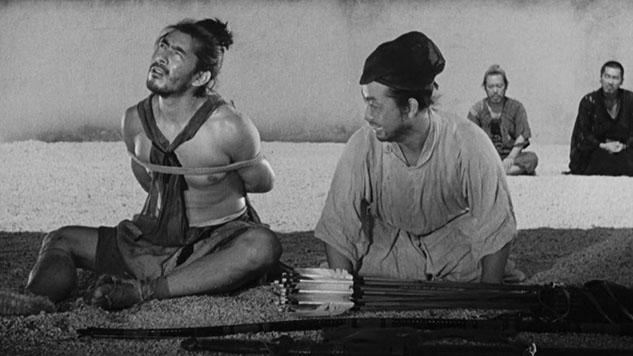
Taking shelter from a torrential rainstorm in a demon-haunted temple, two men struggle to comprehend the story of a murder. They have witnessed crimes before, but something about this one has left them shell-shocked. One of them laments, “This time, I may finally lose my faith in the human soul.”
What follows in Akira Kurosawa’s Rashomon is perhaps the most famous example of point-of-view storytelling in cinema, as four witnesses to the murder recount their wildly different, contradictory versions of the crime. The conflicting point-of-view narrative device has also been used in movies such as Harakiri, Hero, and Vantage Point.
Most point-of-view films use the device to gradually reveal the true events obscured and distorted by each teller’s version of the story, but Kurosawa uses it differently here, because with each version of the crime, the truth only becomes murkier. As one character says, “The more I hear, the more confused I get.”
All of the versions agree on a few points: Some articles of clothing and a rope were left in the forest; a wife and husband were attacked by Tajomaru (Toshiro Mifune), an infamous bandit; Tajomaru forces himself on the wife; the husband is killed. Beyond these basic facts, though, the stories become so convoluted and sordid it seems the real truth may never be known.
In Rashomon, Kurosawa is not seeking to simply solve a mystery. Indeed, it is difficult to say whether the mystery is ever solved at all. Instead, he paints a picture of hell: “If men don’t trust each other, this world might as well be hell.” When we cannot definitively know the truth, what is there to fall back on? Is there any way to trust people who might be lying to us?
In the end, Rashomon provides a sort of resolution, but as with the rest of the film, it all depends on interpretation. It might be an act of God, or it might just be a change in the weather.
—Tyler Petty
- Directed by: Akira Kurosawa
- Produced by: Minoru Jingo Masaichi Nagata
- Written by: Ryûnosuke Akutagawa Akira Kurosawa Shinobu Hashimoto
- Music by: Fumio Hayasaka
- Cinematography by: Kazuo Miyagawa
- Editing by: Akira Kurosawa
- Release Date: 1950
- Running Time: 88
- Language: Japanese
Arts & Faith Lists:
2005 Top 100 — #75
2010 Top 100 — #75
2011 Top 100 — #62
2015 Top 25 Films on Memory — #1